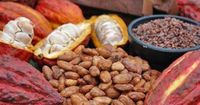The global commodity market is witnessing significant developments, particularly in cocoa, sugar, and coffee sectors. As of April 1, 2025, the cocoa market is experiencing price surges due to supply concerns from West Africa, while sugar traders are keeping a close eye on potential demand increases after Ramadan. Meanwhile, coffee prices are fluctuating as Brazil's harvest remains stable, but risks loom due to weather conditions.
In the cocoa market, prices have increased sharply in the first quarter of 2025, primarily driven by worries about supply from West Africa. Reports from farmers in the Ivory Coast, the world's largest cocoa producer, indicate that current humidity levels are favorable for the mid-April to September harvest, even though rainfall has been lower than average. This situation helps maintain a steady production level and alleviates short-term supply concerns. However, long-term issues such as the decline in cocoa planting areas and climate change continue to pose significant threats. Prices remain historically high due to low production forecasts from Ghana and Nigeria, two other major cocoa-producing countries. If weather conditions in the Ivory Coast remain favorable, prices may adjust slightly in the near future. Conversely, any disruptions in harvest or exports could reignite upward pressure on prices.
Turning to the sugar market, traders are closely monitoring potential demand increases as Ramadan comes to an end. This period typically sees an uptick in sugar imports from large consuming nations such as Indonesia, India, and those in the Middle East, potentially driving prices higher. Additionally, a Brazilian investor is seeking funding for a sugarcane project aimed at sustainable fuel production, which, if successfully launched, could impact the available sugar for export and thus affect market prices. Recent data from ICE US indicates that investors have significantly reduced their short positions on sugar futures contracts as of the week ending March 25, suggesting a less pessimistic market outlook and the possibility of a price recovery in the short term.
In the coffee market, Brazil's upcoming harvest is projected to match 2024 levels, indicating no significant decrease in supply. Organizations such as Co-Op Cooxupe and Marex have reported that farmers are investing in farm renovations following last year's drought, which severely impacted many coffee producers. Currently, record levels of new or replanted areas could lead to improved yields this year. However, stable production does not necessarily guarantee lower coffee prices, as the market is influenced by various factors including inventory levels, exports from Vietnam, global demand, and currency fluctuations. The Brazilian Real remains weak against the USD, which may incentivize Brazilian farmers to sell coffee on the international market, exerting slight downward pressure on prices. Nevertheless, steady coffee demand in major markets like the US and Europe is preventing prices from falling too drastically.
On April 1, 2025, Robusta coffee prices on the London market decreased by $72 to $85 per ton, ranging from $5,100 to $5,300 per ton. Specifically, the delivery price for May 2025 is $5,184 per ton, while July, September, and November 2025 delivery prices are $5,220, $5,191, and $5,103 per ton, respectively. Similarly, Arabica coffee prices on the New York floor also saw a decline, dropping by 4.70 to 5.05 cents per pound, with prices ranging from 357.00 to 379.95 cents per pound. For May 2025 delivery, the price is 374.70 cents per pound, with July, September, and December 2025 prices at 370.70, 365.60, and 358.30 cents per pound, respectively. Brazilian Arabica coffee prices decreased slightly by $1.30 to $1.70 per ton, ranging from $452.10 to $482.50 per ton, with May 2025 delivery priced at $482.50 per ton.
In Vietnam, the average coffee purchase price in the Central Highlands decreased by 600 to 800 VND per kilogram, averaging 132,300 VND per kilogram on April 1, 2025. Specifically, the price in Dak Lak is 132,300 VND per kilogram, in Lam Dong it is 131,200 VND per kilogram, in Gia Lai it is 132,200 VND per kilogram, and in Dak Nong it is also 132,300 VND per kilogram. The daily coffee price listed by Giacaphe.com is calculated based on the prices of the two global coffee markets, combined with continuous surveys from businesses and purchasing agents in key coffee-growing regions across the country.
Experts predict that coffee prices may stabilize in the short and medium term due to profit-taking pressures and abundant supply, but they will remain high in the long term. Over the past five weeks, Arabica coffee prices have fluctuated weekly, while Robusta coffee prices have steadily decreased since peaking in March 2025. The primary reason for the recent price drop is the forecast of rain in Brazil, which alleviates concerns about prolonged drought. The supply of Robusta coffee in Vietnam and Indonesia is currently limited, with Vietnamese farmers holding onto their stock, expecting higher prices in the future. A trader noted that Vietnam is almost the only source of Robusta coffee at the moment. Despite being in the dry season, irrigation in coffee-growing areas is sufficient to meet demands. However, weather conditions in both Vietnam and Brazil will be crucial, especially with the potential for the La Niña phenomenon later in the year, which could significantly affect the harvest and prices.


